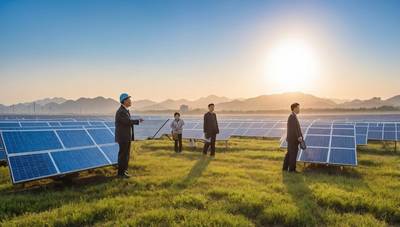Analysts say that China has set a renewable energy goal which it can easily exceed.
The climate goals that China made public on Tuesday promise to continue expanding renewable energy. It has done so at an accelerated pace. However, there is no commitment from China to increase its share of power generation or reduce coal. In announcing China's first goals for carbon reduction, President Xi Jinping stated that China's wind and solar energy capacity would be increased six-fold from the levels of 2020 to 3,600 gigawatts in 2035.
Analysts say that China's tendency to set goals they know it can achieve is evident in its achievement of the 1,200 GW target six years earlier than scheduled. Yao Zhe is the global policy advisor for Greenpeace East Asia. He said that this week's revised targets by the world's biggest carbon emitter are again unambitious.
Yao stated that if wind and solar growth continues at the current rate, total installations would exceed 3,000 GW in 2030 and 4,500 GW in 2035.
Anders Hove is a senior research fellow with the Oxford Institute for Energy Studies. He said that China's renewables problem is not a capacity issue, but a surge in curtailment rates.
Grid managers curtail power to the grid in order to balance the demand with the supply or because of infrastructure constraints.
Hove said China needs to focus on renewable energy, which will replace electricity generated by coal and gas. Xi stated that China will aim to reduce greenhouse gas emissions from their peak by 7%-10%. Analysts expect this to happen sooner than the official 2030 target.
The targets announced Wednesday are the first since China, in 2020, said that it would reach its peak carbon emission by 2030 and achieve carbon neutrality for the economy by 2060.
The new goals were supposed to be a roadmap for progress. However, the headline figure fell short of the 30% reduction in emissions that observers say is required to keep China on course to achieve carbon neutrality by the year 2060. The measured targets contrasted with the remarks of U.S. president Donald Trump who called climate change a "con-job".
Michael Davidson is a professor at the University of California San Diego who studies renewable energy systems in China.
He said that China would be very reluctant to cap the growth of demand. Xi did not set new coal targets or reiterate a 2020 target, when China stated it would "phase out" coal usage between 2026- 2030. It has built and permitted new coal mines. (Reporting and Editing by Tony Munroe, Barbara Lewis and Colleen Waye)
(source: Reuters)

